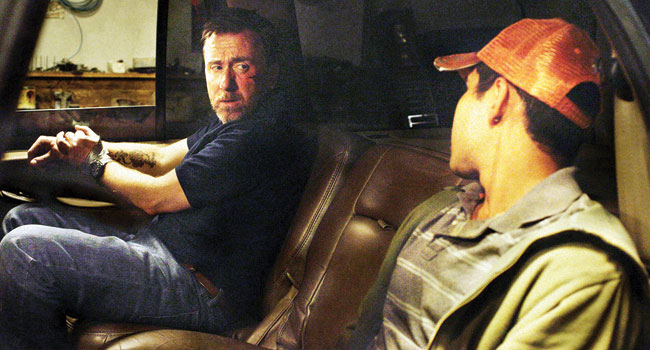There are few actors for whom I would wholeheartedly embrace
a return to challenging roles as much as Tim Roth. There was a time in the early to
mid-‘90s when Roth was an essential part of some truly great cinema, including
Robert Altman’s “Vincent & Theo,” Peter Greenaway’s “The Cook, the Thief,
His Wife & Her Lover,” and, of course, Quentin Tarantino’s “Reservoir Dogs”
and “Pulp Fiction.” He even landed a well-deserved Oscar nod for 1995’s “Rob
Roy.” Sure, he pops up in important movies twenty years later (like “Selma”),
but he just doesn’t seem to be getting the juicy roles he once did. And two
films that played at the Chicago International Film Festival this week prove
that he still has the acting chops to deliver. A movie-loving boy can dream
that these flawed works are just the warm-up for the true comeback that begins
with this fall’s “The Hateful Eight.”
The superior of the two films is Gabriel Ripstein’s
promising debut “600 Miles.” Ripstein’s measured thriller starts with a bit of
a misdirection. We watch two young men navigating the world of gun purchases.
Of course, we’re supposed to notice when one of them is asked for ID to buy
cigarettes and not the ammunition in the same purchase. We soon learn that one
of the near-teens—two boys who are constantly pretending to be men—is named
Arnulfo Rubio (the natural Kristyan Ferrer) and is personally carrying the
purchased weapons and ammunition over the Mexican border to arm a dangerous
cartel. He is an immensely minor player in a major game, someone who seems
destined to make a series of bad decisions before he dies at a young age. Will “600
Miles” be a cautionary tale about the innocent lives sucked up by the vicious
world of illegal drug and gun running?
Yes and no. “600 Miles” takes a turn, and becomes something
more interesting than that slow-burn first act, when we meet Hank Harris (Tim
Roth), an ATF agent introduced in a parallel shot to the one that opens the
film—shopping for guns. But Harris’ purpose is different—he’s kind of
patrolling a local gun show, talking to vendors about unusual purchases and
recording serial numbers in case the weapons pop up later at crime scenes.
Harris is trying to take down some potential major gunrunners before they
supply truly awful people with firepower when he essentially runs into Rubio.
Of course, he has no idea who Rubio is—that’s how far this young man is down
the chain. But Arnulfo panics. He ends up taking Harris hostage, choosing to
take him back to Mexico and let his family figure out what to do with him. On
the long journey, Rubio and Harris form a unique friendship as the ATF agent
senses that this kid is just caught up in something WAY bigger than him.
Ripstein proves himself a very deliberate filmmaker, often
shooting “600 Miles” in long, restricted takes. A scene in which Rubio and
Harris are stopped at a checkpoint that seems to be run by a drug cartel has an
added tension because Ripstein keeps us in the back seat with Hank, slowly
turning the camera for a few shots, but providing no coverage or cuts. There
are several shots of forced perspective like this, and while they sometimes
feel like tricks designed to add tension to a screenplay that’s often
lacking in it, they’re effective. However, the best thing about “600 Miles” is
the performance by Roth, who brings a spark of energy to a film desperately
needing it just through his remarkably engaged performance. He’s always been an
actor who seems genuinely in the moment, listening to his co-stars, and
responding in ways that feel organic. “600 Miles” is something of a near miss—mostly
because it needed another rewrite to punch up its thinner characters and scenes—but
Roth’s performance nearly saves it.

His acting work goes even further to salvage the frustrating
“Chronic,” featured in the festival’s Main Competition. Writer/director Michel Franco’s drama has some interesting commentary about grief
and caretaking, but is ultimately undone by a simply horrendous ending, one that makes you question whether its creator ever had any idea what film he was making.
For most of its 92-minute running time, “Chronic” is a very
meditative, nearly silent character study of a man who has chosen to give his
entire existence to caring for others because of a tragedy in his own past. Is
he atoning? Trying to do what he couldn’t before? Roth is David, a full-time
caretaker for the very ill. “Chronic” cycles through a few of his clients in
its running time, including a woman who is so thin she looks literally on death’s
door, a man limited in his communication due to a stroke, and eventually a woman
handling the pain of chemo. Franco’s approach is practical and unrelenting. We
watch David shower his clients and feed them in real time. It’s a stark vision
of the end of life, and a man willing to row these people across the River
Styx.
If “Chronic” had just been that drama, I think Roth and Franco
would have been up to the challenge. Unfortunately, it’s not just that movie. David spends his
nights staring at the Facebook pictures of a young woman (Sarah Sutherland).
Who is she? Why is he obsessed with her? And then David’s life unravels further
when the family of one of his clients accuses him of sexual abuse. The charges
are unfounded, but will this push David further into clear depression and make
him do something desperate?
That in-the-moment ability of Roth to convey the large presence of
his characters carries “Chronic,” and he’s the reason to see this challenging
film. And so it’s particularly sad that Franco sells him out in the final
beats, making you wonder the film’s entire purpose. Still, what we should be
focusing on is that one of the best dramatic actors of 20 years ago is
being cast in challenging roles in challenging films. Even if they aren’t
successful, I’m glad to have him back.












